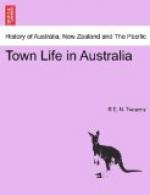BUSINESS.
The Australian Insurance Banking Record informs me that there are no less than 24 joint-stock banking companies, with 750 branches doing business in Australia. They all pay dividends of from 6 to 18 per cent. to their shareholders, besides putting handsome sums every year to their reserve funds, so that banking business is fairly profitable here. The existence and prosperity of so many banks in a community which, all told, is considerably smaller than the population of London, is chiefly due to the wealth of the small number of people who form it, and also to the wider range of business which the banks undertake. Nearly everybody who is worth L100 has a banking account, and most people who have an account have overdrafts, which are given for the most part on purely personal security. The banks also advance freely on growing crops, wool on the sheep’s back, and all kinds of intangible security. Many of the largest merchants are to all intents and purposes mere bank-agents. It is quite a common thing for ordinary working-men to keep bank accounts; and all farmers, even the smallest, are obliged to keep them; for in the country specie payments are almost unknown, and the smallest sums are paid by cheque. Even in the towns, residents usually pay any sum over a pound by cheque. Although this practice has opened the door to a good deal of fraud, its convenience is obvious. You need never keep more than a few shillings in your pocket, and your bank keeps all your accounts for you.
In a community in which every class is largely dependent upon his goodwill, the banker occupies the highest social position, almost irrespective of his merits. It is this excessive dependence upon the banks which largely accounts for the excessive ups and downs of colonial life. In times when money is easy the banks almost force it upon their customers. When it is tight, many people who are really solvent are forced into the Gazette, and a panic ensues, from which it takes the country some time to recover.




